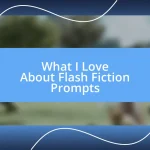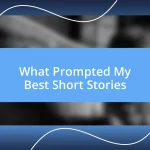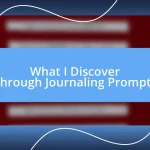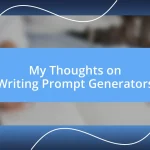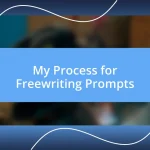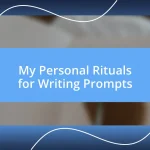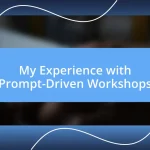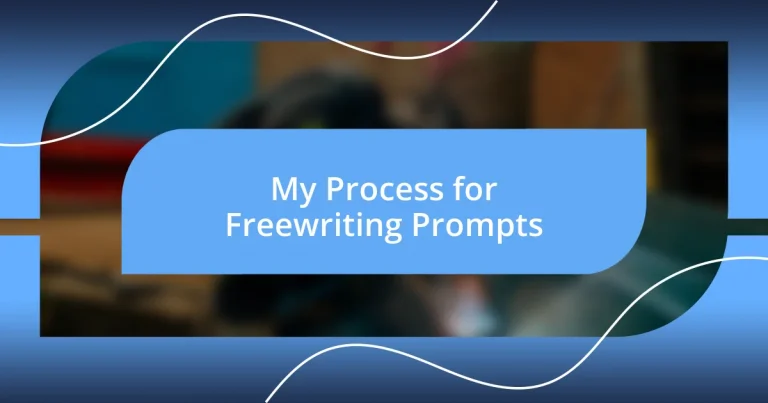Key takeaways:
- Freewriting techniques enable creative freedom by allowing thoughts to flow without self-criticism, often leading to new insights and ideas.
- Effective freewriting prompts are specific, emotionally triggering, and can incorporate playful or absurd elements to encourage creativity.
- Creating a conducive writing environment, minimizing distractions, and involving others can enhance the freewriting experience and help overcome writer’s block.
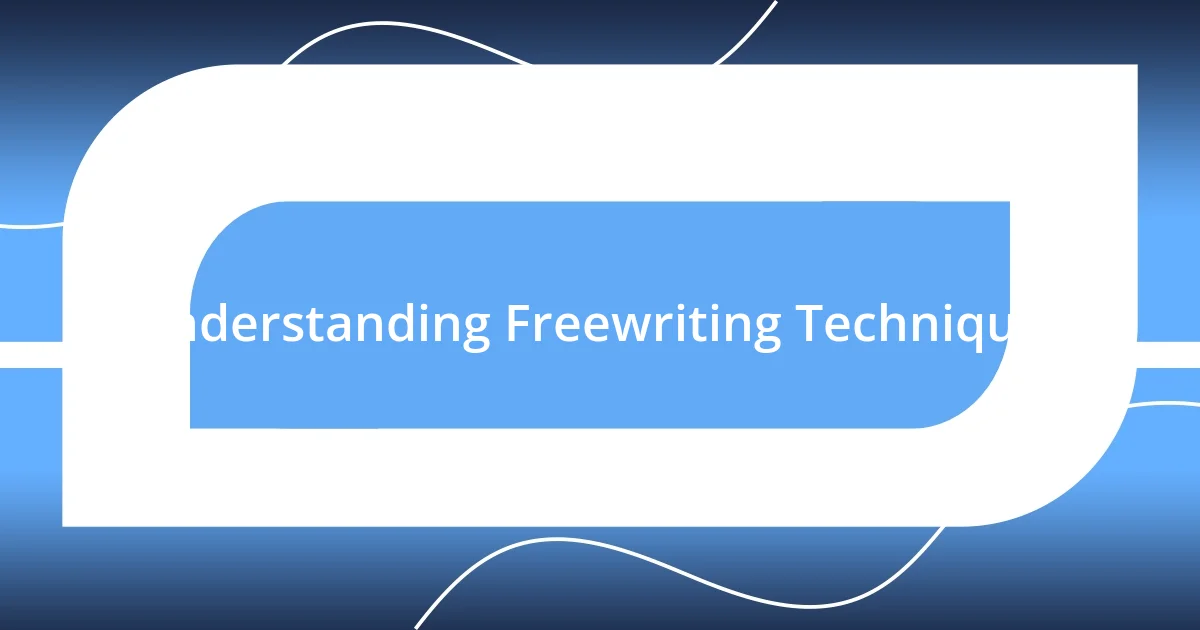
Understanding Freewriting Techniques
Freewriting techniques are about letting go of your inner critic and allowing thoughts to flow freely onto the page. I remember a time when I was stuck on a project and felt paralyzed by self-doubt. It was only after I set a timer for ten minutes and scribbled down everything on my mind—no edits, just raw emotion—that new ideas began to surface.
One important aspect of freewriting is the sense of liberation it provides. Have you ever felt that surge of relief when you realize you can express yourself without worrying about grammar or structure? For me, it was a game changer. I often use it as a warm-up exercise to clear mental clutter before diving into more structured writing.
Another technique I find effective is thematic freewriting, where I focus on a specific prompt or theme. For instance, when exploring the concept of resilience, I would write my experiences and reflections, consciously connecting my thoughts. This method not only deepens my understanding but often reveals insights I hadn’t considered before. How about you—have you explored a specific theme in your own freewriting journey?

Benefits of Freewriting Prompts
One of the most significant benefits of using freewriting prompts is the freedom they bring to your creativity. I once experienced a moment of frustration when attempting to write a story. I turned to freewriting, and without any expectations, the characters I had been struggling to develop sprang to life on the page. It’s astonishing how these prompts can break down barriers and allow your imagination to roam, often leading to unexpected and delightful outcomes.
- They encourage spontaneity, reducing the pressure to write perfectly.
- Freewriting can help unlock new ideas and perspectives.
- It acts as a mental warm-up, clearing out the cobwebs before more focused work.
- Many find it nurtures self-discovery, leading to deeper personal insights.
- It can improve writing fluency as you get more comfortable with expression.
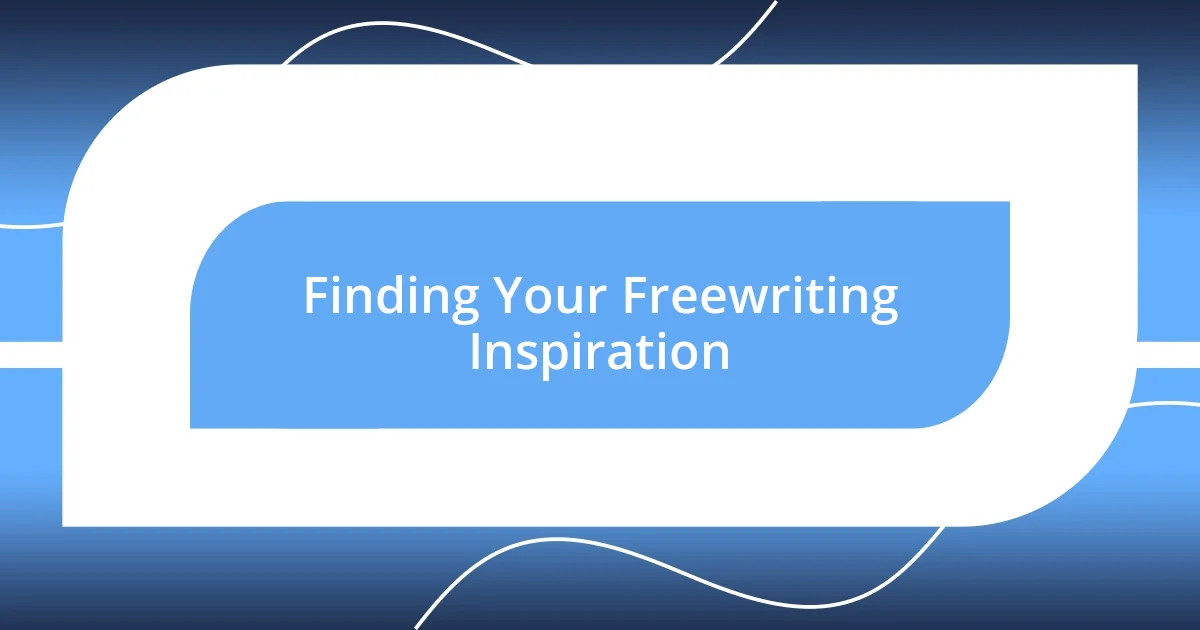
Finding Your Freewriting Inspiration
Finding inspiration for freewriting can sometimes feel like a quest, but it doesn’t have to be. I often find myself inspired by simple moments in my daily life, like a walk in the park or a profound conversation with a friend. For instance, one rainy afternoon, I began freewriting about the emotions stirred by the sound of raindrops on my window, which unexpectedly transformed into a poetry piece. Don’t underestimate the power of everyday experiences—they can ignite your creativity in ways you might not anticipate.
Another interesting source of inspiration is music. I recall a time when I played my favorite album while jotting down whatever came to mind, allowing the melodies to guide my thoughts. The rhythm and emotion in the songs opened a floodgate of ideas that flowed onto the page. This method not only fuels my imagination but also helps me tap into my emotional responses—something pivotal during my writing process.
Lastly, nature frequently serves as a muse for my freewriting. I cherish moments spent outdoors, where the sights and sounds of the natural world spark my creativity. I remember sitting by a lake, watching the gentle ripples, and suddenly felt compelled to write about the theme of tranquility. Each of these experiences—whether from daily life, music, or nature—offers a unique lens through which I can explore my thoughts and feelings.
| Source of Inspiration | Personal Experience |
|---|---|
| Everyday Life | Writing about the emotions of a rainy day led to a beautiful poem. |
| Music | Listening to an album inspired a flood of creative ideas. |
| Nature | A moment by the lake prompted deep reflections on tranquility. |
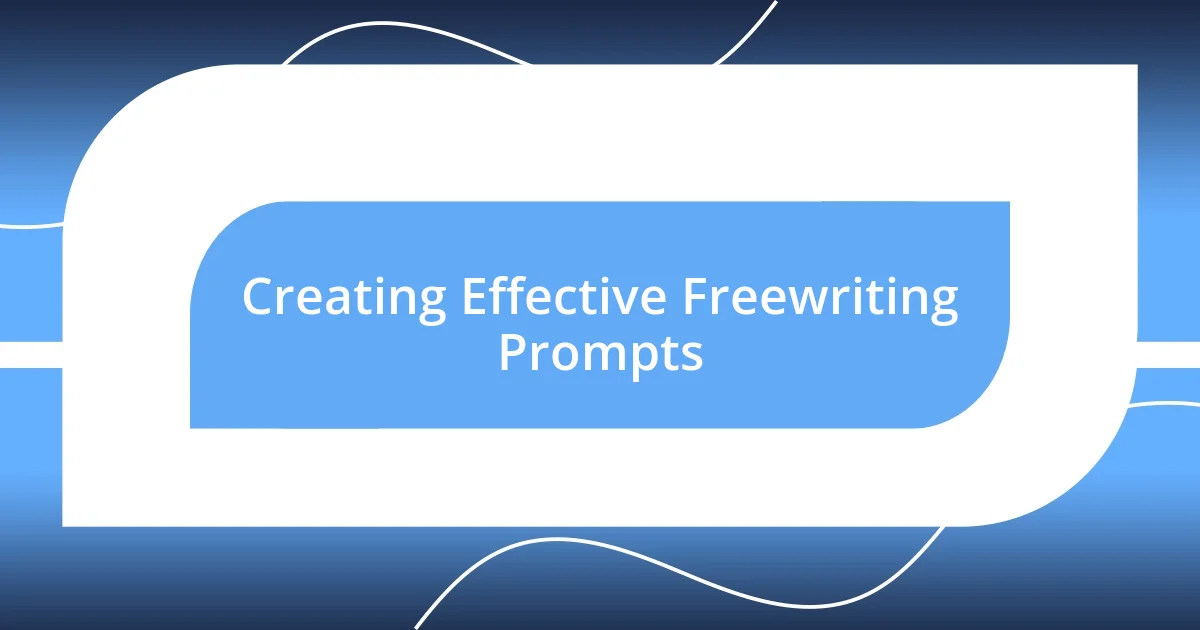
Creating Effective Freewriting Prompts
When creating effective freewriting prompts, I’ve found that specificity is key. For instance, instead of a vague prompt like “write about a day,” I might choose something more targeted like “describe a moment when you felt completely at peace.” This precision helps to guide the mind and spark tangible imagery. Have you ever noticed how a focused prompt can unlock memories that you didn’t even realize were just beneath the surface?
Another useful approach is to incorporate emotional triggers. I often think back to a challenging time in my life and transform those feelings into prompts. For example, I might write, “What does disappointment smell like?” This question not only invokes past experiences but also encourages deeper reflection and exploration. It’s fascinating how a seemingly simple question can lead me to profound insights.
Finally, I like to experiment with playful or absurd prompts to tap into my creativity. I once jotted down, “Describe a conversation between your favorite book character and a fictional creature.” This whimsical approach allowed me to blend ideas in unexpected ways and, surprisingly, led to a story that still resonates with me today. How often do we sideline our imagination in favor of seriousness? Embracing a bit of silliness can be surprisingly liberating in the writing process.
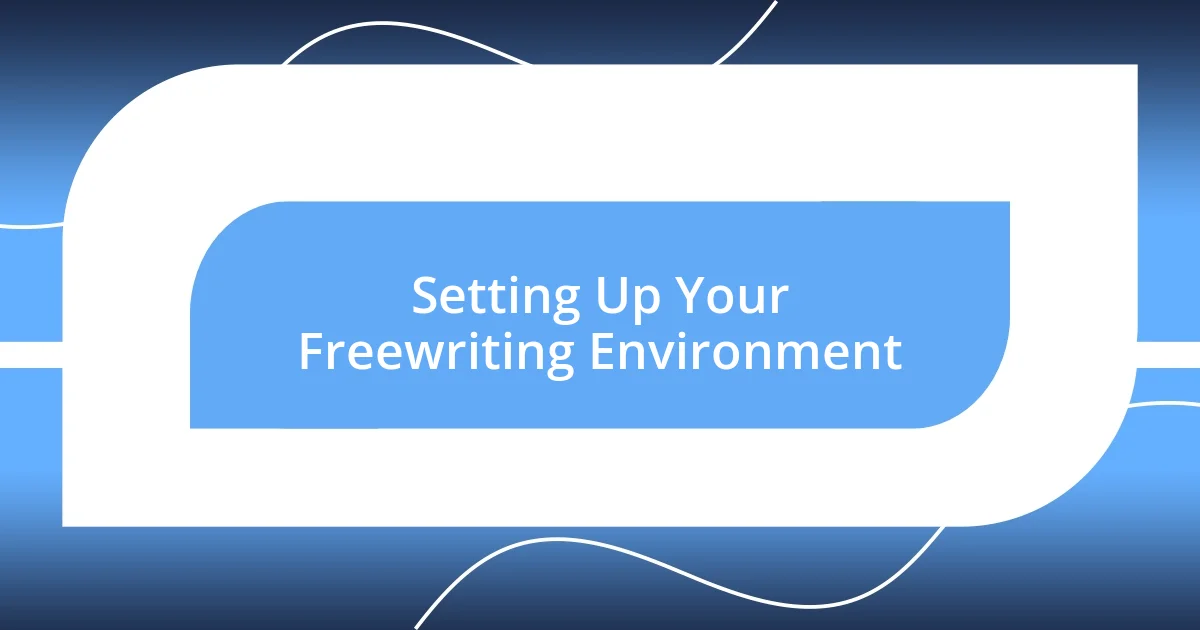
Setting Up Your Freewriting Environment
Creating the right environment for freewriting can significantly enhance your creative flow. Personally, I find that a designated writing space works wonders. I remember transforming a small corner of my living room into a cozy nook, complete with a soft chair, a warm blanket, and inspiring decor. Whenever I sit there, my mind feels free to explore without distractions. Have you thought about how much a familiar, comfortable space can impact your creativity?
Another key element is minimizing distractions. Sometimes, I switch off my phone or use website blockers for those pesky social media sites that can sidetrack my thoughts. I recall a freewriting session where I decided to turn off my email notifications—what a difference that made! It was as if a weight lifted, allowing me to dive deep into my thoughts without constant interruptions. Have you ever tried unplugging from the digital world while writing? You might be surprised at the depth of focus you can achieve.
Finally, I’ve learned the importance of atmosphere in my writing environment. Soft instrumental music or ambient sounds often set the perfect mood for my freewriting sessions. I vividly remember a time when I played a playlist of soothing ocean sounds while writing about my childhood memories. The waves rolling in the background seemed to prompt memories I hadn’t thought about in years. What kind of sounds or music inspire you? Creating an atmosphere that resonates with your inner thoughts can be a game changer for your writing.

Strategies for Overcoming Writer’s Block
Some days, the words just won’t come, and I’ve learned to embrace that frustration instead of fighting it. A quick technique I use is the 5-minute freewrite. I set a timer for just five minutes and write anything that comes to mind, even if it’s “I don’t know what to write.” It’s amazing how this little exercise can break the chains of self-doubt and get the words flowing again. Have you tried this less-pressured approach during those tough writing moments?
Another effective strategy is changing your writing medium or format. One time, I switched from typing on my laptop to writing in an old notebook with a fountain pen. It brought a wonderful sense of nostalgia and tactile satisfaction that sparked my creativity in ways I hadn’t anticipated. It got me thinking about how a different setting or tool can sometimes stir your thoughts. Have you ever considered how a simple change in your writing environment could reshape your perspective?
Lastly, I find that involving another person can work wonders for overcoming writer’s block. I remember a particularly stagnant writing session, so I reached out to a friend. We talked through our ideas, and I was amazed at how their questions and insights helped clarify my thoughts. What I realized was that collaboration can ignite new ideas that I hadn’t even considered. Have you ever turned to someone else to reignite that spark? Engaging dialogue can be the catalyst for overcoming those pesky creative barriers.


